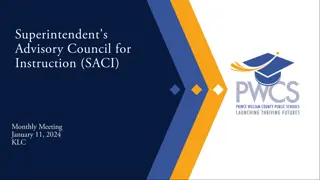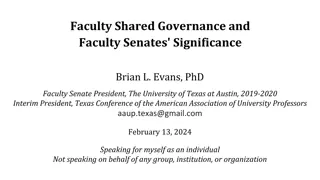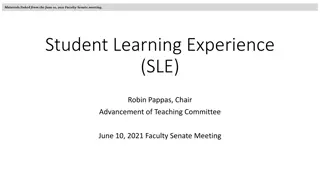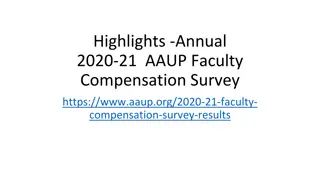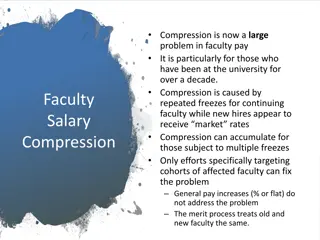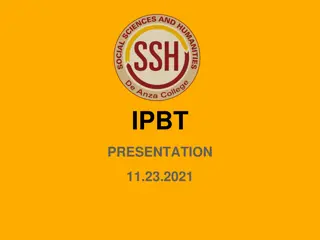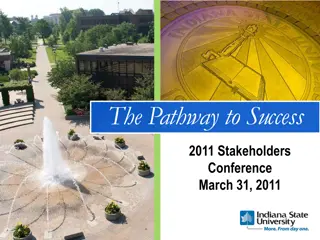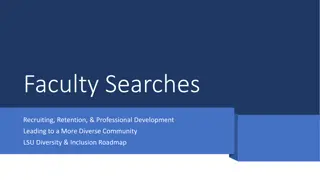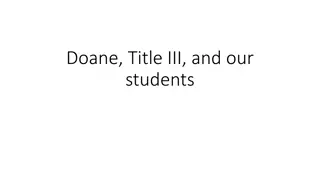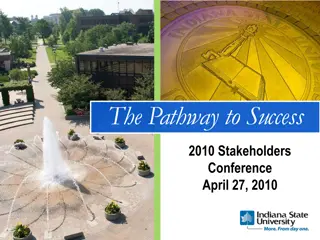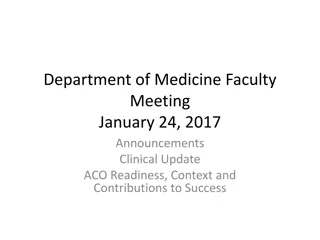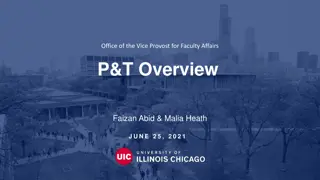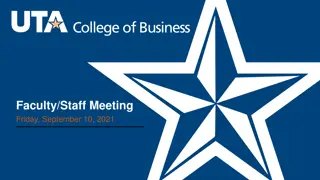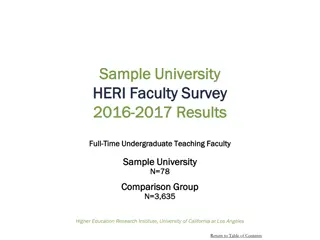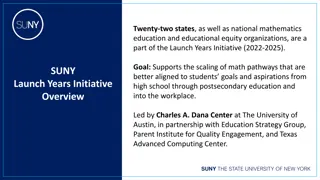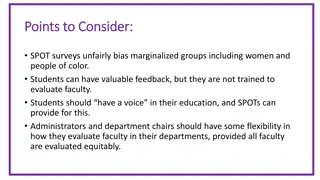
NDSU Student Profile and Retention Strategies for Success
Discover the profile of incoming students at NDSU, including demographics, academic qualities, and retention rates. Gain insights into useful resources and strategies for student success. Explore key data and information to enhance student outcomes and overall academic performance at North Dakota State University.
Download Presentation

Please find below an Image/Link to download the presentation.
The content on the website is provided AS IS for your information and personal use only. It may not be sold, licensed, or shared on other websites without obtaining consent from the author. If you encounter any issues during the download, it is possible that the publisher has removed the file from their server.
You are allowed to download the files provided on this website for personal or commercial use, subject to the condition that they are used lawfully. All files are the property of their respective owners.
The content on the website is provided AS IS for your information and personal use only. It may not be sold, licensed, or shared on other websites without obtaining consent from the author.
E N D
Presentation Transcript
Look Whos Coming to Your Classroom: NDSU Student Profile, Useful Resources and Strategies for Student Success Laura Oster-Aaland, Enrollment Management Emily Berg, Institutional Research and Analysis Casey Peterson, Student Success Programs
Profile of Incoming Students Fall 2016 Gender Male 54% Female 46% State of Residency North Dakota 34% Minnesota 57% Other U.S. 8% International 1% Ethnicity Asian Black/African American Nat.Hawaiian/Pac. Islander Hispanic Am. Indian/Alaska Native White Two or More Not Specified 1.68% 2.92% 0.08% 3.32% 0.28% Age Under 20 yrs. 20-21 years 22 and above 98.84% 0.68% .48% 87.18% 3.84% 0.72%
Profile of Incoming Students Fall 2016 Academic College Ag, Food Sys, Nat Res 9% Arts, Hum, Soc Sci Business Engineering Health Professions Human Dev & Educ Science & Math Undeclared Top 5 Majors Undeclared Pre-Nursing Pre-Mechanical Eng 6% Pre-Business Admin 5% BS-Computer Sci 9% 7% 11% 11% 20% 14% 10% 16% 9% 4%
Profile of Incoming Students Fall 2016 Academic Qualities Average ACT Average HS GPA 3.43 1st in Class National Merit Presidential (ACT > 29) Admission Guidelines ACT 22 HS GPA 15 Core Courses 23.89 2.75 109 7 261
NDSU Retention Context First Year Retention and Academic Standing 100% 78% 78% 80% 80% GPA 3.50 ACT 23.87 GPA 3.43 ACT 22.46 8% 10% 8% 10% GPA 3.02 ACT 22.33 14% 12% 12% 10% 0% 2012 2013 2014 2015 Not Retained - Unsuccessful Not Retained - Successful Retained
NDSU Retention Context Peer Median = 77.0% University of Arkansas 83% Kansas State University 83% University of Nevada-Reno 82% Oklahoma State University-Main Campus 81% Mississippi State University 80% North Dakota State University-Main Campus 80% South Dakota State University 77% University of Idaho 77% University of Wyoming 76% Montana State University 76% New Mexico State University-Main Campus 74% Utah State University 71% 0% 10% 20% 30% 40% 50% 60% 70% 80% 90%100% Peer Median
Success Factors Student Characteristics ACT/SAT HS GPA Socio-Economic Status Parental Education Ethnicity Mental Health Concerns Motivation Tinto, 1987; Berger, 2000; Paulsen & St. John, 2002 Institutional Characteristics Involvement with Peers Interaction with Faculty Engaged Learning Astin, 1993; Tinto, 1987; Pascarella & Terenzini, 2005
Transition Questions How does this place work? Where are my classes? Will I fit in? Who will talk to me? Am I smart enough? Can I manage the workload? Will others think I m smart enough?
Transition Needs The basics Housing, food, heat, safety Sense of belonging Not feeling alone Feeling of mattering Would be missed Contributions noticed Maslow,1943
Mattering & Identity Marginality and Mattering Attention Importance Ego-Extension Dependence Appreciation Identity Development Foreclosure Identity Diffusion Moratorium Identity Achievement Marcia, 1980 Schlossberg, 1989
What role can faculty play in student success?
Engagement, Mattering, Validation at NDSU NDSU Students Want meaningful personal interaction during advising Want to feel engaged in the classroom and with faculty Don t want to feel like a number
Engagement, Mattering, Validation In Practice Learn student names. Set high expectations and be explicit. Approach failures from a mindset of not yet . Reflect diverse student backgrounds in content. Show concern for struggle, celebrate success. Provide opportunities for peer interaction and reinforcement. Recognize students elsewhere on campus. Encourage involvement in your area. Refer for other services. Believe in student ability.
Resources for Students Student Success Programs ACE Tutoring TRIO Student Support Services (SSS) TRIO McNair Scholars Program Center for Writers Technology Learning and Media Center Disability Services Counseling Center
Additional Resources for Students and Faculty NDSU One Stop Registration and Records Liaisons Advising Resource Center Student Activities Office Career Center On-campus employment website Career preparation Student Financial Services
Campus Wide Initiatives STEPS to Success Posters, hand outs and digital displays available for faculty Mindset Project Welcome Week Enhancements Gateways-ND Learner-focused STEM Instructional Cohorts
References Astin, A.W. (1993). What matters most in college: Four critical years revisited. San Francisco, CA: Jossey-Bass. Berger, J. B. (2000). Optimizing capital, social reproduction, and undergraduate persistence: A sociological perspective. In J. M. Braxton (Ed.), Reworking the student departure puzzle (pp. 95-126). Nashville, TN: Vanderbilt University Press Dweck, C.S. (2006). Mindset: The new psychology of success. Random House: New York. Kuh, G. D. (2009). What student affairs professionals need to know about student engagement. Journal of College Student Development. 50(6), pp. 683-706. Kuh, G. D., Schuh, J. H., Whitt, E. J., et al (1991). Involving Colleges: Successful approaches to fostering student learning and development outside the classroom. SanFrancisco, CA: Jossey-Bass Publishers Marcia, J. E. (1980). Identity in adolescence. Handbook of adolescent psychology, 9(11), 159-187. Maslow, A. H. (1943). A theory of human motivation. Psychological Review, 50(4), 370-96. National Survey of Student Engagement. http://nsse.indiana.edu/ Noel Levitz (2013). Higher Ed Benchmarks: Noel-Levits Report on Undergraduate Trends in Enrollment Management. www.noellevitz.com/documents/shared/Papers_and_Research/2013/2013_Retention_Indicators.pdf Pascarella, E. & Terenzini, P. (2005). How college affects students (Vol 2). San Francisco, CA: Josey-Bass. Paulsen, M.B., & St. John, E.P. (2002). Social class and college costs. The Journal of Higher Education, 73(2), 189-236. Rendon Linares, L. I. & Munoz, S. M. (2011). Revisiting validation theory: Foundations, applications, and extensions. Enrollment Management Journal, Summer 2011, 12 26. Schlossberg, N. K. (1989). Marginality and Mattering: Key issues in building community. New Directions for Student Services, No. 48. Tinto, V. (1987). Leaving College: Rethinking the causes and cures of student attrition. Chicago Il: University of Chicago Press. Tough, P. (2014) Who gets to graduate. New York Times available at www.nytimes.com/2014/05/18/magazine/who-gets-to- graduate.html?_r=2
Questions/Comments Laura Oster-Aaland, Vice Provost for Student Affairs & Enrollment Management Laura.Oster-Aaland@ndsu.edu 231-7052 Emily Berg, Director of Office of Institutional Research and Analysis Emily.A.Berg@ndsu.edu 231-8263 Casey Peterson, Director of Student Success Programs Casey.Peterson@ndsu.edu 231-7750


